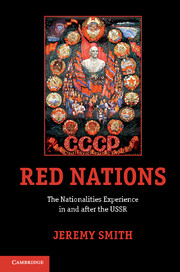Book contents
- Frontmatter
- Dedication
- Contents
- Tables
- Preface
- 1 Introduction: the prison-house of nations
- 2 Dispersal and reunion: revolution and civil war in the borderlands
- 3 Bolshevik nationality policies and the formation of the USSR: the Bolsheviks dispute national policy
- 4 Nation-building the Soviet way
- 5 Surviving the Stalinist onslaught, 1928–1941
- 6 The Great Patriotic War and after
- 7 Deportations
- 8 Territorial expansion and the Baltic exception
- 9 Destalinisation and the revival of the republics
- 10 Stability and national development: the Brezhnev years, 1964–1982
- 11 From reform to dissolution, 1982–1991
- 12 Nation-making in the post-Soviet states
- 13 The orphans of the Soviet Union: Chechnya, Nagorno Karabakh, Abkhazia, South Ossetia and Transdniester
- Conclusion
- Bibliography
- Index
- References
13 - The orphans of the Soviet Union: Chechnya, Nagorno Karabakh, Abkhazia, South Ossetia and Transdniester
Published online by Cambridge University Press: 05 June 2014
- Frontmatter
- Dedication
- Contents
- Tables
- Preface
- 1 Introduction: the prison-house of nations
- 2 Dispersal and reunion: revolution and civil war in the borderlands
- 3 Bolshevik nationality policies and the formation of the USSR: the Bolsheviks dispute national policy
- 4 Nation-building the Soviet way
- 5 Surviving the Stalinist onslaught, 1928–1941
- 6 The Great Patriotic War and after
- 7 Deportations
- 8 Territorial expansion and the Baltic exception
- 9 Destalinisation and the revival of the republics
- 10 Stability and national development: the Brezhnev years, 1964–1982
- 11 From reform to dissolution, 1982–1991
- 12 Nation-making in the post-Soviet states
- 13 The orphans of the Soviet Union: Chechnya, Nagorno Karabakh, Abkhazia, South Ossetia and Transdniester
- Conclusion
- Bibliography
- Index
- References
Summary
In the years after the collapse of the Soviet Union, a majority or significant part of the population in five territories refused to accept the status determined for them by the governments of the new states and recognised by the international community – Chechnya in the Russian Federation, Nagorno Karabakh in Azerbaijan, South Ossetia and Abkhazia in Georgia and Transdniester in Moldova. The demand for outright independence (or union with Russia) has been the bottom line in all five cases, while the newly independent states have appealed to the principle of territorial integrity in insisting that the territories remain within their borders. No amount of negotiation over the precise status of each region has been successful in finding a compromise between two positions which are essentially incompatible. The apparent impossibility of breaking out of a situation where each territory (apart, eventually, from Chechnya) is ungovernable by the state in which international recognition locates it has earned the disputes the label of ‘frozen conflicts’, while the regions themselves are often described as ‘breakaway’.
Supporters of both sides have frequently appealed to ancient history to support their case. The esoteric nature of these disputes contrasts with the actual origin of the conditions of conflicts which in most cases first broke out in 1905. Rather more apt is the sarcastic characterisation by two American historians of the origins of the Nagorno Karabakh conflict as ‘shrouded in the mists of the twentieth century’. Soviet nationality policies combined with alternating tolerance of and suppression of chauvinistic nationalism preserved, for the most part, ethnic peace in the Caucasus and elsewhere until the late 1980s. But the same policies that prevented conflict also preserved underlying tensions and, crucially, once the structures of the USSR crumbled, the status of a number of territories was thrown into limbo.
- Type
- Chapter
- Information
- Red NationsThe Nationalities Experience in and after the USSR, pp. 322 - 357Publisher: Cambridge University PressPrint publication year: 2013



